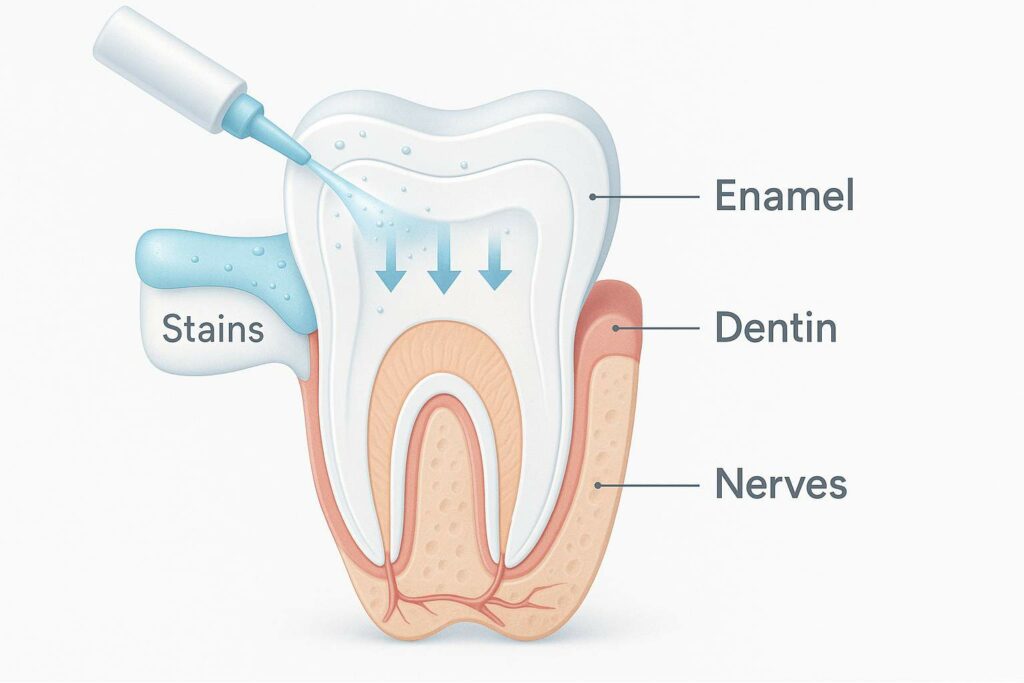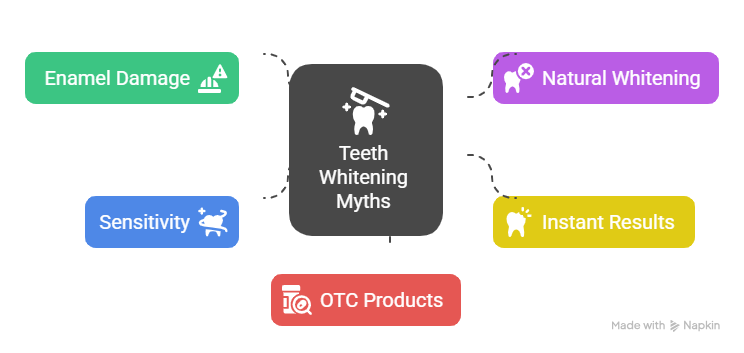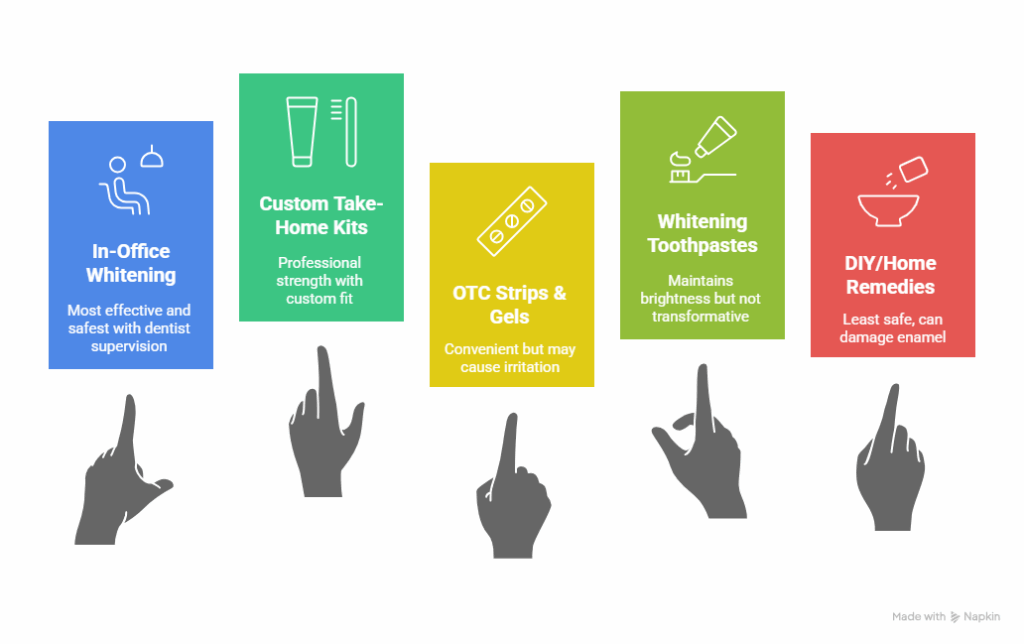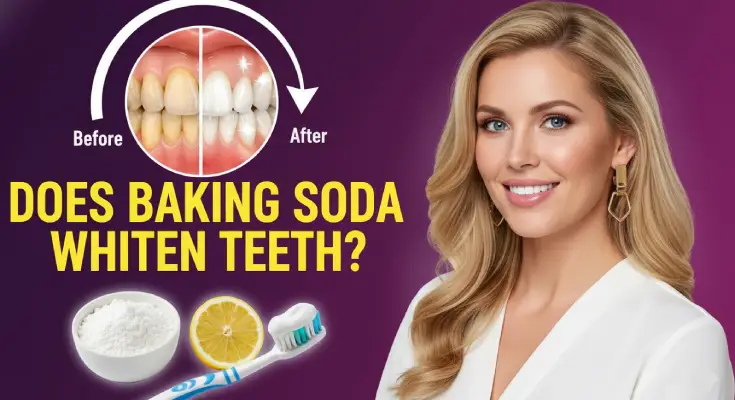Is Dental Whitening Safe? NYC Experts Reveal the Truth
Is dental whitening safe, or could it actually harm your teeth? If you’ve ever hesitated to whiten your smile because of stories about enamel damage or tooth sensitivity, you’re not alone. It’s normal to feel unsure, especially with so much conflicting advice floating around online.
At 65 Broadway Dental in NYC, we get it. Patients ask us all the time if whitening is really worth the risk. The good news? Most of what you’ve heard is either outdated or flat-out wrong.
In this honest, expert-backed guide, we’ll walk you through what’s true, what’s not, and how to safely get the bright, white smile you’ve been dreaming about, without any guesswork. Let’s debunk the fear and talk facts.
Is Teeth Whitening Safe for Everyone?
Yes, when done correctly.
Professional teeth whitening is a widely used and well-studied procedure. Dentists use safe concentrations of hydrogen peroxide or carbamide peroxide to break apart stains without harming your teeth or gums. When supervised by a dental professional, whitening is a safe cosmetic option for most people.

However, safety depends on:
- The health of your enamel
- The method and product used
- How often do you whiten
When overused or misused (especially with DIY hacks or generic OTC kits), whitening products can cause sensitivity, gum irritation, or even enamel erosion. That’s why your safest path to a radiant smile is under the care of a licensed dental professional.
5 Common Myths About Teeth Whitening (Debunked by NYC Dentists)
Think teeth whitening sounds too good to be true? You’re not alone. With so much buzz online, it’s easy to fall for outdated or misleading advice. So, is dental whitening safe? Let’s clear the air. NYC dentists are setting the record straight by debunking the five most common myths about teeth whitening, so you can brighten your smile with confidence.

Myth #1: Whitening Will Damage Your Enamel
Is dental whitening safe for your enamel? That’s one of the most common concerns we hear, and the answer is yes, when it’s done right.
The truth is, professional whitening treatments don’t “strip” your enamel. They work by oxidizing stains within the enamel, not destroying it. You might feel a bit of sensitivity afterward (which is completely normal and temporary), but true enamel damage? That’s only a risk if you’re using harsh DIY methods or overdoing it without professional guidance.
At 65 Broadway Dental, we use protective gels and customized treatment plans to keep your enamel safe every step of the way.
Myth #2: Baking Soda or Lemon Juice Is Safer Than Bleach
You may have seen influencers claiming that “natural” whitening with baking soda or lemon juice is better than using peroxide-based products. But let’s be clear: just because it’s natural doesn’t mean it’s safe.
Is dental whitening safe when done with kitchen ingredients? Not really. Baking soda is highly abrasive and can wear down your enamel over time. Lemon juice? It’s acidic and can weaken your enamel, making your teeth more vulnerable to decay and discoloration.
If you want long-lasting results without harming your smile, stick with dentist-approved options, not pantry experiments.
Myth #3: Whitening Toothpaste Works Instantly
We hate to break it to you, but that whitening toothpaste promising instant results? It’s not the miracle product you think it is.
Whitening toothpaste is great at removing surface stains, like coffee or wine residue, but they don’t reach the deeper discoloration inside your enamel. So if you’re asking, “Is dental whitening safe and effective when it comes from a toothpaste?” The answer is: it’s safe for daily use, but not powerful enough for dramatic changes.
Think of it as maintenance, not transformation.
Myth #4: Whitening Is Unsafe If You Have Sensitive Teeth
Let’s clear this one up: having sensitive teeth doesn’t mean whitening is off-limits.
In fact, most professional treatments are designed with sensitive teeth in mind. You might experience some mild tingling or temperature sensitivity, but it’s usually short-lived and manageable.
So, is dental whitening safe for people with sensitivity? Yes, as long as you talk to your dentist first. We often recommend using a desensitizing toothpaste or Fluoride Treatments and sometimes even a Night Guard to help reduce sensitivity before and after whitening.
Myth #5: Over-the-Counter Products Work Just as Well as Professional Whitening
Sure, OTC strips and gels are easy to grab at the drugstore, but don’t expect the same results you’d get from a dentist.
These products contain lower levels of peroxide, and the trays or strips are one-size-fits-all (which often means uneven application and irritated gums). If you’re asking, “Is dental whitening safe when done at home with OTC kits?”, the answer is sometimes, but it’s far less controlled.
Professional whitening treatments are stronger, safer, and fully customized. At 65 Broadway Dental, we’ll pair your whitening plan with Smile Design services to ensure your results fit your facial structure and aesthetic goals.
What Science Says: How Whitening Affects Your Teeth & Gums
If you’ve ever asked yourself, “Is dental whitening safe?”, you’re definitely not alone. And the answer, backed by real science, is yes, when done properly, whitening is considered safe and effective by dental professionals around the world.
Here’s how it works: Most whitening products use peroxide-based agents, either hydrogen peroxide or carbamide peroxide. These ingredients break down the stain molecules inside your enamel, targeting both surface stains (from coffee, wine, or smoking) and deep discoloration that builds up over time.
Now let’s talk safety.
- No, it doesn’t erode your enamel. Research shows that whitening doesn’t weaken or strip the enamel when used as directed, especially under professional supervision.
- The most common side effect? Temporary sensitivity. This happens because the peroxide can slightly dehydrate the teeth, but the feeling usually goes away in 24 to 48 hours. Patients who’ve had implants should follow best practices for dental implant care to maintain gum health during whitening treatments.
- Your gums are protected, too. In-office whitening treatments use barriers and customized trays to keep the gel away from sensitive areas, minimizing irritation.
The key to safe whitening is moderation and professional guidance. Overusing whitening kits or using them incorrectly (like leaving them on for too long) can lead to gum irritation or tooth sensitivity, but that’s easily avoided with the right care.
So yes, dental whitening is safe, as long as you skip the TikTok hacks and trust your dentist.
Types of Teeth Whitening & Their Safety Levels (Ranked Best to Worst)
Not all teeth whitening methods are created equal, and some can actually do more harm than good. If you’re wondering which options are both safe and effective, we’ve ranked them below, starting with the most dentist-approved and ending with the ones to avoid.
Let’s break it down:

1. In-Office Whitening (Most Effective & Safest)
If you’re looking for instant results and peace of mind, this is the gold standard.
- Custom treatment with stronger whitening agents
- Your dentist protects your gums and monitors everything
- Results in about 60–90 minutes
2. Custom Take-Home Kits from Your Dentist
These are a great middle ground, professional strength whitening you can do from your couch.
- Custom trays that fit your teeth perfectly
- Gradual whitening over 1–2 weeks
- Much safer than store-bought kits
3. Over-the-Counter (OTC) Strips & Gels
These are easy to find but come with limitations.
- Lower peroxide concentration = slower results
- One-size-fits-all trays or strips can irritate gums or cause uneven whitening
4. Whitening Toothpastes
Good for keeping your teeth bright, but don’t expect a dramatic transformation.
- Helps scrub off surface stains
- Some formulas may be too abrasive if used daily
5. DIY/Home Remedies (Least Safe)
We’ve all seen the viral lemon juice, charcoal, or baking soda tricks, but don’t fall for them.
- Acidic or abrasive ingredients can wear down enamel
- No control over safety, dosage, or pH
Is Whitening Safe for Teens, Seniors & People with Dental Work?
You might be wondering if teeth whitening is safe for everyone, and the answer depends on a few factors, like age, dental history, and whether you’ve had any restorative dental work. Let’s break it down.
Teens: Hold Off Until Enamel Matures
Teeth whitening might sound tempting to teens, especially with all the social media pressure, but it’s not recommended before age 14 to 16. Why? Because their tooth enamel is still developing, whitening agents can make younger teeth more sensitive.
👉 Once the enamel has fully matured, usually around age 16, professional whitening (under a dentist’s guidance) becomes a safer option. Until then, focus on brushing well and avoiding stain-causing drinks like soda or dark juices.
Seniors: Results May Vary
As we age, our teeth naturally darken, not just from stains, but because the dentin underneath the enamel (which is more yellow) starts to show through.
For seniors, this means standard whitening might not be as effective. You may need a stronger or more targeted approach, such as in-office whitening, to see noticeable results. Your dentist can guide you based on the condition of your teeth and any age-related sensitivity you may have.
People with Dental Work (Veneers, Fillings, or Crowns)
Teeth whitening only works on natural enamel. If you have Composite Fillings or Porcelain Crowns & Bridges, they won’t whiten along with your natural teeth, which may create mismatched shades if you brighten the rest. This can lead to uneven shades, where your real teeth brighten up, but your restorations stay the same.
Signs Whitening Might Not Be Right for You
You should avoid or postpone whitening if you have:
- Active gum disease
- Untreated cavities
- Cracked or decayed teeth
- Are you pregnant or nursing (as a precaution)
Start with a professional dental exam to ensure your teeth are healthy enough for whitening.
How to Whiten Safely: NYC Dentist-Approved Tips
Whitening your teeth can seriously boost your confidence, but it’s important to do it the right way to avoid sensitivity, uneven results, or damage. Here’s how to safely brighten your smile, step by step, just like we recommend at 65 Broadway Dental:
Before You Start Whitening
A little prep goes a long way!
- Get an Oral Exam and Cleaning before whitening – We always suggest seeing your dentist before whitening. This helps catch any cavities or gum issues that could get irritated during the process.
- Use a desensitizing toothpaste – Start brushing with one about a week ahead of time. It helps reduce the chances of that “zingy” sensitivity some people feel after whitening.
While You’re Whitening
This is where people tend to go overboard, don’t!
- Stick to the recommended time – Leaving gel or strips on too long won’t make your teeth whiter, just more sensitive.
- Avoid snacking or sipping during whitening – Eating while whitening is a no-go, and drinks can wash away the product too early.
After Whitening: Protect That Glow
Now that your teeth are whiter, here’s how to keep them that way:
- Avoid dark or staining foods for 48 hours, That means coffee, red wine, curry, berries, basically anything that could stain a white T-shirt.
- Rinse with water after meals, Not ready to give up coffee? We get it! Just rinse your mouth with water after you drink it to minimize staining.
- Touch-up only when needed, Depending on your habits, a whitening refresh every 6–12 months is plenty. Don’t overdo it!
How Often Is It Safe to Whiten Your Teeth?
Whitening your teeth too often can backfire, think sensitivity, enamel damage, or even a bluish tint to your smile (yikes!). Here’s a quick guide to how often you should safely whiten based on the method:
- In-Office Whitening:
Professional treatments are powerful, so once every 6–12 months is usually enough. Your dentist will tell you when it’s time for a refresh. - Take-Home Kits (From Your Dentist):
These are safe for regular use, but always follow your dentist’s exact instructions; they’re tailored to your enamel and stain level. - Over-the-Counter Strips or Gels:
Stick to one cycle every few months (usually no more than 14 days per round). Overdoing it can cause sensitivity and patchy results.
Pro Tip: When in doubt, wait it out. Whitening less frequently keeps your enamel strong and your results more natural.
When Whitening Goes Wrong: Signs You Should Stop
Most people whiten without issues, but if your teeth or gums start acting up, it’s time to hit pause. Watch out for these red flags:
- Gum irritation or white patches on the gumline
- Uneven results (like splotches or spots that don’t match)
- Tooth sensitivity that lingers beyond a few days
If you notice any of these, stop whitening and call your dentist, especially if you’re using a store-bought kit. It’s better to adjust your routine than risk long-term damage.
What to Ask Your NYC Dentist Before Whitening
Before you brighten that smile, ask your dentist a few smart questions to make sure it’s safe and effective for your teeth:
- Is my enamel healthy enough to whiten?
You don’t want to risk sensitivity if your enamel is worn down. - Which method works best for my lifestyle and goals?
If you’re always on the go, in-office may be best. If you like a gradual change, a take-home kit might be perfect. - Will I have side effects like sensitivity?
Everyone reacts differently; your dentist can recommend a desensitizing plan if needed. - What about my crowns, fillings, or veneers?
Whitening won’t change the color of dental work, which could leave you with mismatched teeth. Your dentist will help you plan for that.
Also Read
Conclusion
Don’t let fear or misinformation hold you back from a confident, white smile. Whitening is one of the safest cosmetic dental treatments available today, when done under the supervision of a skilled professional.
At 65 Broadway Dental, we’re here to guide you toward the safest, most effective path to a brighter smile. Schedule a consultation today and find out what whitening solution is best for your teeth.
Your radiant smile starts here. Book your visit with our NYC whitening experts today.

Dr. Alexander Heifitz (Author)
Dr. Alexander Heifitz is the founder of 65 Broadway Dental in NYC, where he combines advanced dental expertise with a patient-first approach. He specializes in cosmetic and restorative treatments such as dental implants, veneers, Invisalign, and smile makeovers, helping New Yorkers achieve both oral health and confidence.
Booking An Appointment
Looking for a reliable dentist in Downtown NYC? Whether you need a routine cleaning, urgent care, or a full smile transformation — we’ve got you covered. We accept most PPO insurance plans and offer flexible scheduling.
+1 (212) 430-3888
Call for appointment
Walk-ins Welcome / Same-Day Appointments Available

Related Blogs

The Best Way to Whiten Your Teeth: Proven Methods That Actually Work
Discover the best ways to whiten your teeth safely. Learn proven methods, dentist-recommended treatments, and tips to get a brighter, long-lasting smile.
Read More
Does Baking Soda Whiten Teeth? The Complete Evidence-Based Answer
Discover how baking soda can naturally brighten teeth, what results to expect, and the science behind its whitening effect.
Read More